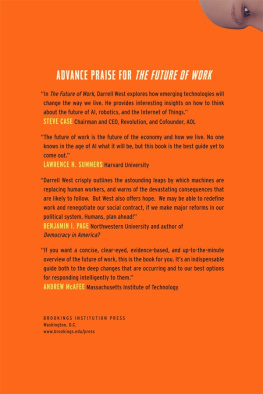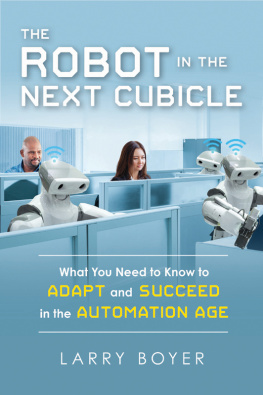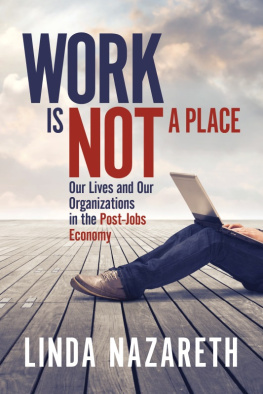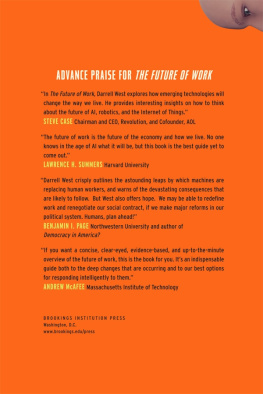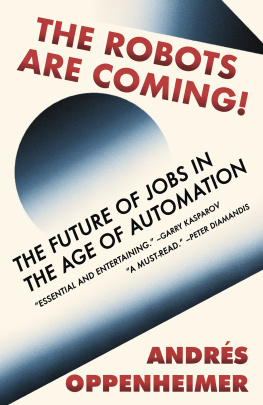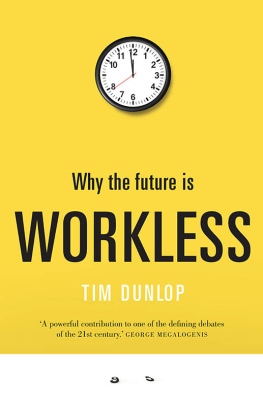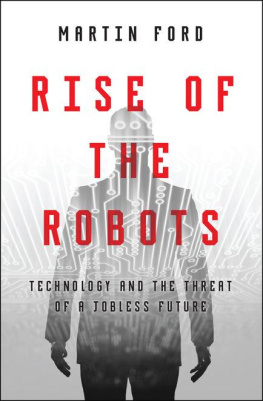THE FUTURE OF WORK
ROBOTS, AI,AUTOMATION
Darrell M. West
Brookings Institution Press
Washington, D.C.
Copyright 2018
THE BROOKINGS INSTITUTION
1775 Massachusetts Avenue, N.W., Washington, D.C. 20036
www.brookings.edu
All rights reserved. No part of this publication may be reproduced or transmitted in any form or by any means without permission in writing from the Brookings Institution Press.
The Brookings Institution is a private nonprofit organization devoted to research, education, and publication on important issues of domestic and foreign policy. Its principal purpose is to bring the highest quality independent research and analysis to bear on current and emerging policy problems. Interpretations or conclusions in Brookings publications should be understood to be solely those of the authors.
Library of Congress Cataloging-in-Publication data are available.
ISBN 9780815732938 (cloth : alk. paper)
ISBN 9780815732945 (ebook)
9 8 7 6 5 4 3 2 1
Typeset in ITC Legacy Serif
Composition by Elliott Beard
To Jenny Lu Mallamo,
Hillary Schaub, and
Liz Valentini
The best assistants an author can ever have
CONTENTS
PREFACE
I REALIZED SOMETHING noteworthy was happening when my assistant Hillary came to me with an unusual experience. I had asked her to reschedule an appointment and she had emailed Amy, the personal assistant of the individual with whom I was to meet. Amy was amazingly prompt in her follow-up, and when she did not get a response from Hillary over the weekend, she emailed my assistant multiple times trying to find a date that would work.
It was only at this point Hillary noticed Amy was a virtual assistant. Working for an artificial intelligence (AI) firm that schedules meetings, Amy performed the tasks of a human assistant who read emails, discerned intent, and came up with a relevant response. Other than the AI title buried in her signature line, there was nothing in the exchange that would lead anyone to conclude the correspondent was virtual other than her incredible persistence over a weekend.
In reflecting on this experience, I realized that a digital assistant trained in intelligent response is not a futuristic vision. Rather, it is a current reality that performs quite well. This and other automated tools no longer are alone at the cutting edge of technology. Rather, robots, AI, virtual reality, autonomous vehicles, facial recognition algorithms, drones, and mobile sensors are altering numerous sectors and leading us to an automated society.
In this book, I explore the impact of these emerging technologies on work, education, politics, and public policy. If companies need fewer workers as a result of automation and robotics, but most societal benefits are delivered through full-time jobs, how are people outside the workforce for a lengthy period of time going to get income, health care, and retirement pensions? In this situation, it is important to rethink work and move toward lifetime learning so that people are trained for a world of dislocation. There are reforms in the social contract that would ease the transition difficulties, but it is not clear the U.S. political system is up to the task of adopting relevant policies. If leaders dont make the right choices, developed nations could end up facing serious economic and political disruptions.
The plan of this book is as follows. commerce and ushering in new business models. The reality of a large workforce with full-time jobs and benefits is giving way to an economy based on temporary employees, partial or no benefits, and widespread automation.
software design make it possible to perform complex tasks using sophisticated algorithms. The result is an increase in economic activity but limited full-time employment opportunities other than for workers such as coders, computer experts, designers, and data scientists. These innovations are changing the way companies operate and altering the relationship between managers and employees.
of digital services that will transform commerce and communications.
activities. New forms of identity will be possible when the job no longer defines peoples personal meaning and those in the workforce have time to engage in hobbies, personal interests, and community projects.
arise a large and permanent underclass that does not receive job benefits and is trapped in poverty.
necessitates education and training programs throughout adulthood. People will need to acquire additional skills in order to remain competitive in the twenty-first-century economy.
the skills they will need. Society is fragmented, governance systems are polarized, news coverage is not very substantive, and it is hard for people to have meaningful conversations about how to reimagine the social contract. Figuring out ways to facilitate productive discussions and address the resulting political tensions will be a major challenge in coming decades.
the Electoral College, reforming campaign finance, and adopting a solidarity tax to fund needed social programs.
An early version of this project was presented in 2015 through my Brookings Institution paper titled What Happens If Robots Take the Jobs? The Impact of Emerging Technologies on Employment and Public Policy. In it, I looked at the accelerating nature of technology innovation and the ramifications for employment, workforce development, and public policy. I appreciate the help of Gisele Huff, Gerald Huff, and Jerry Hume in supporting that project. This book also draws on publications I wrote exploring AI, the Internet of Things, driverless cars, digital education, mobile technology, smart transportation, megachange, news media, and inequality.
I wish to thank several people for their help with this book. I am indebted to Jack Karsten, Karin Rosnizeck, Jake Schneider, Nicole Turner-Lee, and Tom Wheeler for conversations about the book. Grace Gilberg, Jack Karsten, Hillary Schaub, and Kristjan Tomasson provided valuable research assistance on this project. External reviewers Kevin Desouza of Arizona State University and Dipayan Ghosh of Harvard University and the New America Foundation provided helpful suggestions on the manuscript. A number of individuals at the Brookings Institution Press deserve a special thank you. Press director William Finan and assistant director and sales manager Yelba Quinn provided invaluable counsel on the title and marketing for the book. Janet Walker and Elliott Beard deserve a big thank you for overseeing production, and Marjorie Pannell did an excellent job editing the volume. None of these individuals is responsible for the interpretations, which are mine alone.
PART I
ACCELERATING INNOVATION
ROBOTS
RESTAURANT EXECUTIVES ACROSS the United States are reacting to tight labor markets by introducing automated tablets that transmit food orders. Rather than use the services of wait staff, customers place orders through mobile screens. Andrew Puzder, former CEO of CKE Restaurants, the parent company of Hardees, praised digital devices over human workers. Referring to the former,
McDonalds, meanwhile, has announced plans to
In addition, Amazon has expanded rapidly into robots in its distribution warehouses. It has deployed around 55,000 Kiva robots, up from
Truck driving long has been a well-paying job for high school graduates. This occupation does not require a college degree and is an attractive entry-level
As illustrated by these examples, the list of emerging technologies grows every day. Robots, autonomous vehicles, virtual reality, artificial intelligence (AI), machine learning, drones, and the Internet of Things are moving ahead rapidly and transforming the way businesses operate and how people earn their livelihoods. For millions who work in occupations such as food service, retail sales, and truck driving, machines are replacing their jobs. There already is evidence of this happening with blue-collar jobs, but the impact is starting to be felt by the white-collar workforce as well.

